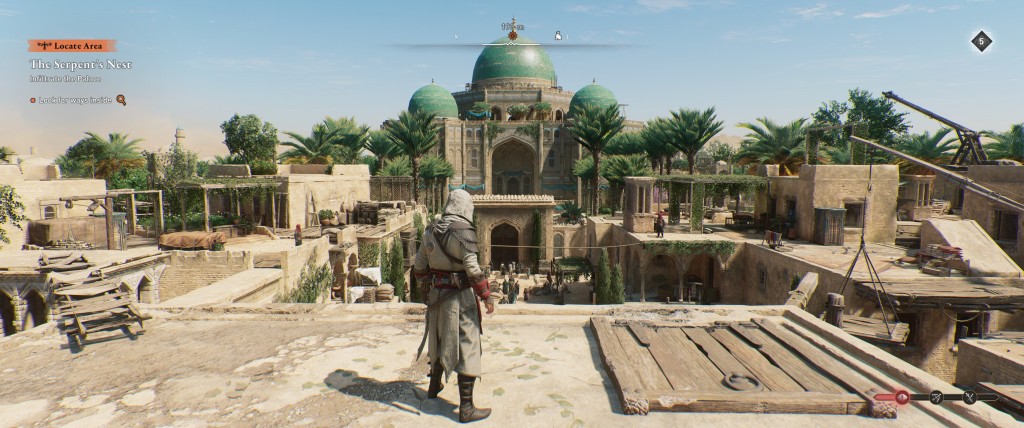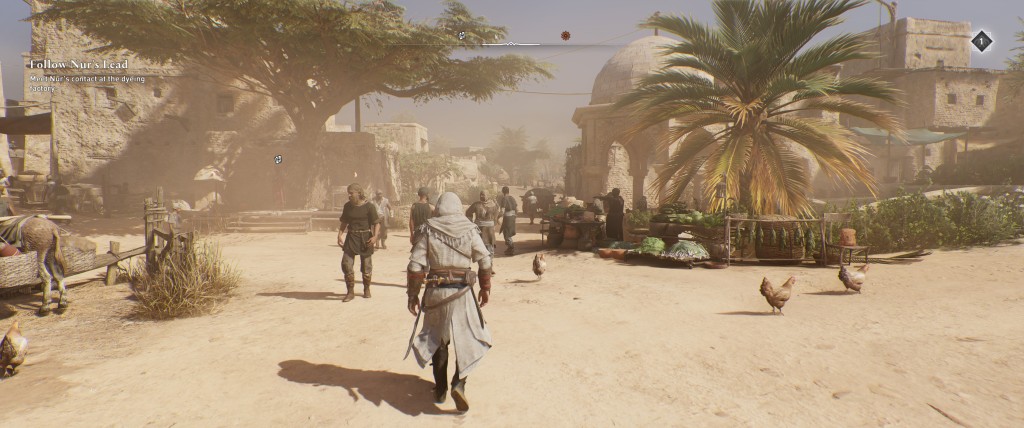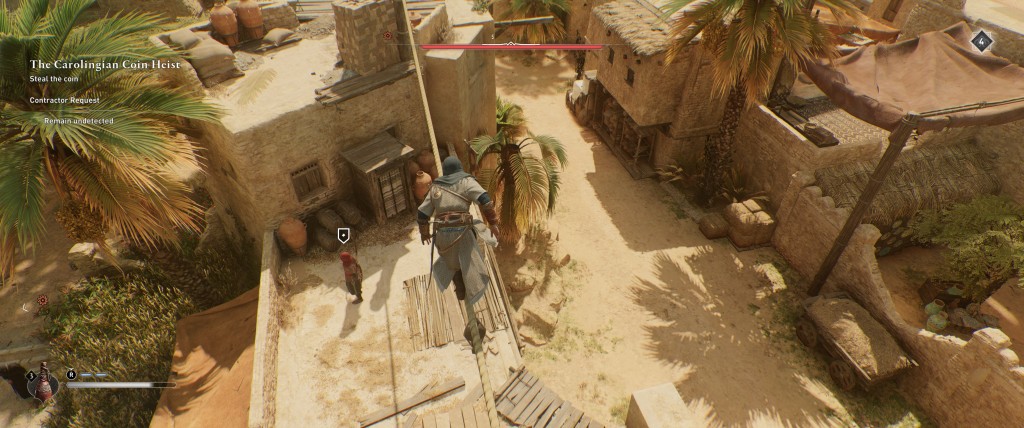Assassin’s Creed Mirage was originally envisioned as a chunk of downloadable content for Valhalla focused on Basim, but the project grew big enough in scope that the decision was made to release it as a standalone title, one marketed as a return to the franchise’s stealthy roots. While the series has found a massive audience with the last three game’s shift to massive RPGs, a dedicated fanbase has remained for the older games that focused on being sneaky and taking out targets quietly. For the most part, Mirage is indeed a return to those days, though it doesn’t entirely abandon some of the modern Assassin’s Creed DNA. Though not perfect and certainly not mind-blowing, Assassin’s Creed Mirage is a solid entry in the series that might show Ubisoft that games don’t have to cost the world to develop or contain hundreds of hours of content.
Unfortunately, Basim’s true importance to the story of Valhalla wasn’t made clear until near the very end, and according to trophy and achievement data only a fraction of people who played Valhalla ever got to that stage. But the good news is that Basim’s story can be played and enjoyed without the full context, although you’d undoubtedly get more from it knowing where Basim winds up.
Mirage tells the story of how a young Basim went from being a thief on the streets of his home to a member of the Assassins, while still also loving room for a follow-up that explores the next stage of his life. Attempting to impress the Hidden Ones with his skills, Basim winds up in contact with an ancient artefact that leads to disaster, bringing Basim under the watchful tutelage of Roshan, voiced by none other than Shohreh Aghdashloo.
Available on: PC, Xbox S/X, PS5
Reviewed on: PC
Developed by: Ubisoft Bordeaux
Published by: Ubisoft
Review code provided by Ubisoft
The tale that Mirage tells is somewhat setup like a mystery, with Basim and his stab-happy new pals attempting to uncover what the Order is doing in Baghdad and exactly who the members are. Each hideout across Baghdad comes with its own series of investigations to uncover the identity of a lesser member or two before culminating in a larger target. Uncover everybody and you’ll get to go after the real power behind the scenes.
Because of this structure, it feels like the writers weren’t able to properly develop Basim’s character. Each investigation is its own thing with tenuous connections to the others that aren’t all that interesting. And each of the villains barely pop up before you add air holes to their skulls, making their demise feel about as satisfying as supermarket sushi. Because of this, Basim doesn’t really develop much between each new investigation because they can be completed in nearly any order, so the writer’s hands are tied. Instead, all of the real development comes in the final section of the game so that Basim can be pointed in the right direction for his role in Valhalla, creating a somewhat jarring series of moments that don’t feel earned or justified.

The quality of the writing is fairly lacklustre too, sadly. It’s most keenly felt in Basim himself. His motivations aren’t well fleshed out, nor can I identify anything about his personality, really. It means in the pantheon of lead Assassin’s Creed characters Basim sits fairly low, perhaps not as flat as the likes of Altair or Connor but certainly nowhere near the heights of Ezio or Kassandra or Eivor. Its made worse by what should be emotional beats falling completely flat, like Basim reuniting with a friend that he parted on bad terms with – it should be an important moment but it barely lasts a minute or two and lacks any feeling.
Mirage scales back the size by a significant amount compared to the last few games that felt more like lifestyle choices than anything else. It’ll take around 15 or 20 hours at most to beat Mirage and do most of the optional content, and all of it is contained in Baghdad and a small chunk of the surrounding desert. I’ve seen some people disappointed by this but I think it’s a sensible and refreshing change. Mirage has been made by a smaller team for a much smaller budget with a lower pricetag which is good in an industry that is currently complaining loudly about rising costs.
Of course, a singular setting does make it tougher to provide some visual variety for the player. And yet I think the developers have done a good job here. Baghdad is split into various sections, and subtle differences help keep it all interesting, like one area being far lusher and greener or another containing a large bazaar packed with people. Every nook and cranny is packed with plenty of detail, too, and like the other games in the series, Mirage sprinkles around codex entries that detail the history of the city. It’s honestly fascinating just to explore the world and soak up the atmosphere.
Speaking of exploring, Mirage obviously uses the traditional freerunning mechanics that have been in the series since the very first game, for better or for worse. I say that because when it works as intended the freerunning is fantastic. It feels terrific to jump, clamber, vault, slide and shimmy across the bustling city. But as veterans of the series know, when it doesn’t work as intended it can range from comical to downright annoying. Sometimes Basim will just come to a halt or he just won’t do what you want, like climbing past a window instead of going through it. But in many regards Basim might be the best character to control in the franchise to date. I can’t put my finger on what the developers have done but it seems like the controls have been tightened up a fraction.

Assassin’s Creed: Mirage is touted as a return to the franchise’s roots. One of the ways Mirage encourages stealth is by drastically decreasing the raw power of the player. In the past few games the inability to consistently assassinate targets in one swift stab combined with how it was possible to take on entire camps in head-on assaults rendered stealth somewhat pointless. It became too easy and effective to slaughter small armies rather than be more subtle. Mirage, on the other hand, returns to the days where assassinating a target means they are dead, no questions asked. There’s only a single enemy type that ignores this rule, and they only appear when you reach maximum notoriety. While Basim is certainly a skilled swordsman, he can’t carve up dozens of foes with ease – around 5 or 6 is the most that can be taken on without getting swarmed – and the combat mechanics are much simpler and even somewhat clunky. A parry, light attack, heavy attack and dodge are the only tools Basim has, along with a single unlockable combat trick designed to help deal with armoured foes. A stamina bar also keeps you from going on the offensive constantly.
I think it would be fair to criticise the combat for being one of the weakest aspects of the game. But for me, it makes fighting feel like the last resort for when you get caught, pushing you to be sneaky rather than slicey dicey. It also encourages the idea of just running away instead of fighting, using that fun freerunning to create space before you hide in some poor bastard’s flowerbed.
The actual acts of stealth and assassinating feel pretty good. This is classic Assassin’s Creed fare, for better or worse, so you’re mostly going to be hiding in long-grass or perched on rooftops waiting for the perfect moment to snag a passing guard and perform some quick brain surgery via pointy wrist jewellery. Whistling also remains an almost worryingly effective means of luring guards to their demise, and as before enemy’s never tend to be overly worried about their missing comrades. I do think an opportunity was missed to not only bring back the classic Assassin’s Creed gameplay but also show how it could be tightened up and improved for a new generation of games. But I’d be lying if I said I didn’t have a lot of fun bouncing around rooftops and dropping onto unsuspecting victims like a kitten with a vendetta. And the return of blending into crowds to sneak around makes me very happy because I still think it’s one of the coolest ideas in the whole franchise.
There’s a handful of big assassinations in the game where your target is holed up in some vast location. In these moments you are told to go scout the area in order to find ways of accessing the target so that you can then access their brain stem with a knife. The typical method of surveying the area with your trusty eagle can be used as can the usual special assassin’s vision which conveniently lets Basim turn into a superhero with X-ray vision. Personally, I like to just explore. Unfortunately, the freedom ends after you get to the target – all paths lead to the same outcome. In this sense the Assassin’s Creed games still feel like they aren’t reaching their full potential. But hey, there’s always the outstanding Hitman 3 for that.

It’s not like Mirage completely ditches everything from the past few games, mind you. For example, new outfits and weapons can be acquired by looting huge golden chests and then further upgrade by gathering up resources and special blueprints. The costumes come with handy perks such as making your kills quieter while the weapons boast different stats and some extra effects. The stats ultimately seem pointless since I couldn’t feel much difference from one to the other, and Basim is limited to using a sword and dagger so there isn’t much variety. The perks tend to be the real difference maker, although I don’t like how Ubisoft keep delving into giving gear what essentially amounts to magical powers like siphoning health.
Then there’s the skill tree which features a small selection of utterly boring upgrades for Basim. There’s really nothing worth discussing here aside from a couple of skills that are ridiculous in their power. One of them, for example, automatically activates x-ray vision when you crouch and marks all the guards. Another lets your eagle display all the possible routes guards will take on patrol. Yes, both serve to make the player more powerful, but they also fundamentally break the game by turning Basim into Baghdad’s equivalent of Batman.
You might have noticed that I haven’t touched upon the ongoing metastory of the Assassin’s Creed franchise. That’s because I just don’t care anymore. Years and years of guff have been piled together and the resulting compost heap is a storytelling mess that is becoming harder and harder to keep from combusting Thankfully, it’s kept to a bare minimum here, at least until the very end where it makes a big reappearance like that one distant family member that pops up from time to time at the get-togethers to steal the food.
I did run into a couple of issues along the way that were fairly big. In one cutscene I was stuck in a loading screen while it played in the background, forcing a restart to view it properly. Something similar happened toward the end when one of the big cutscenes played while I was left staring at a black screen. And I ran into a bug where I couldn’t interact with blacksmiths, though it turns out smacking them with a sword solves the problem.
If this review has come off as slightly negative toward the recent Assassin’s Creed games then let me amend that right now: I actually really enjoy them. Odyssey in particular is a fantastic game which doesn’t suffer from quite the same level of bloat that Valhalla does. But my enjoyment of them is also largely due to me mentally separating them from the rest of Assassin’s Creed. They are so different in their gameplay and core concepts that they actually feel like a completely different trilogy of games from a completely different series.

Assassin’s Creed Mirage, then, appeals to me as a fan of the older games. For the most part, the claims of Mirage returning to the roots of the franchise are true. This is the most Assassin’s Creed feeling Assassin’s Creed we’ve seen in quite some time and I really enjoyed it. I desperately wish for Ubisoft to learn from this smaller, more focused game and consider bringing back the stealth and the assassinations, just with some tweaks. It’s more likely that they’ll continue to produce massive games however, perhaps interspersed with these smaller projects.
But lets focus on Assassin’s Creed Mirage itself rather than the future and what might be. This is a solid, fun adventure that’s let down by a weak story and bland characters. And as much as I love the return to the classic stealth feel, there’s no doubt that formula is showing its age and needs to be updated a little. If you haven’t clicked with the likes of Valhalla and Odyssey then Mirage might be exactly what you’re looking for.





